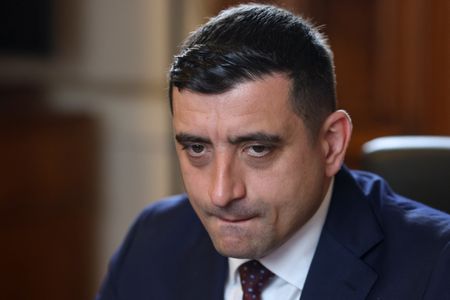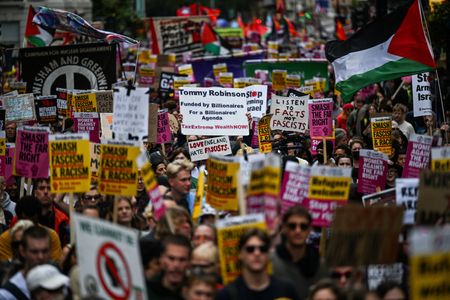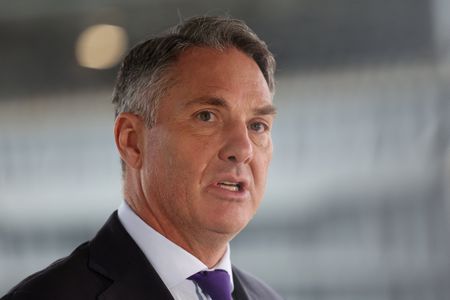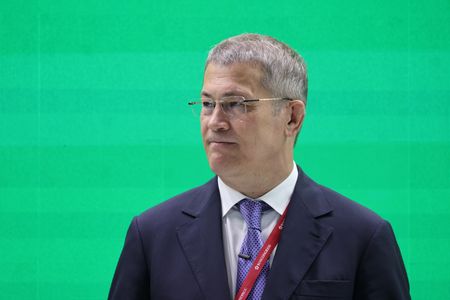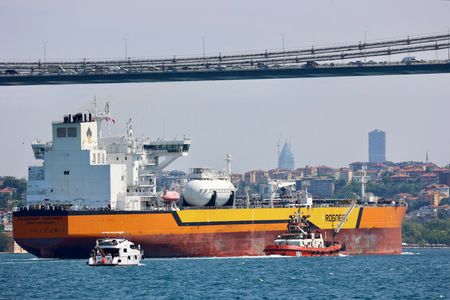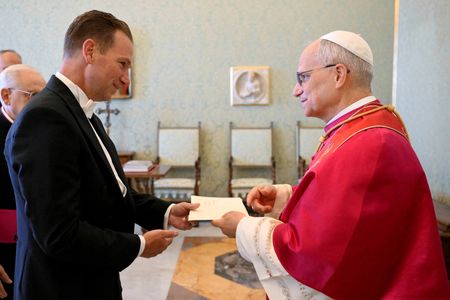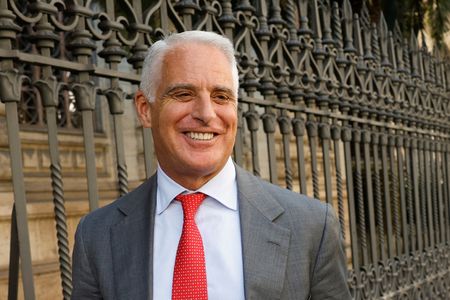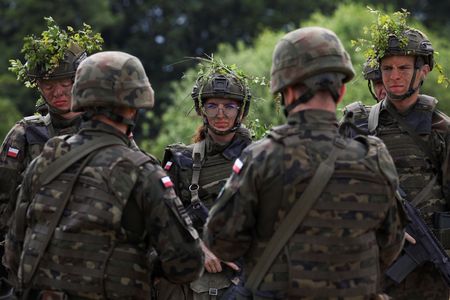By Luiza Ilie
BUCHAREST (Reuters) – Eurosceptic hard-right lawmaker George Simion could be elected Romania’s president on Sunday, riding a wave of popular anger over living costs, corruption and the cancellation of a vote last year that another far-right contender had looked set to win.
Simion decisively swept the first round of the presidential election re-run on May 4 in a ballot that is seen as a test of the rise of Donald Trump-style nationalism in the European Union.
Simion, 38, has been ahead in most opinion polls ahead of the run-off against centrist Bucharest Mayor Nicusor Dan, though the most recent survey this week put them neck-and-neck.
The president has considerable powers in Romania – being the person in charge of the defence council that decides on military aid. The president also has oversight over foreign policy, with the power to veto EU votes that require unanimity among member states.
Simion opposes military aid to Ukraine, is critical of the EU leadership and supportive of U.S. President Donald Trump. A win for Simion in Romania, an EU and NATO member, would risk isolating the country abroad, eroding private investment and destabilising NATO’s eastern flank, political analysts say.
He is campaigning on a “Romania first” ticket, advocating conservative policies and stoking voter anger over high living costs and perceived social immorality that he blames on mainstream centre-left and centre-right politicians and Western elites.
“I believe that just as MAGA won power in the United States, so too the Make Europe Great Again movement will have a majority in European institutions,” Simion, said during a conference before the first election round.
“I do not doubt that anywhere in the free world the wind is that of change and of returning to common sense. The ‘woke’ madness has gone too far.”
Simion’s six-year-old Alliance for Uniting Romanians has grown from a fringe anti-vaccination group during the COVID pandemic to become Romania’s second-largest party.
As a lawmaker, Simion has a history of physical and verbal violence, clashing with other politicians. He has said he regrets his behavior and that he has grown into a statesman.
Simion used to belong to a soccer “ultra” group – organized fan groups often known for violence – and spent years advocating for the unification with neighbouring Moldova before entering politics.
If elected, Simion would get to appoint a new prime minister who would negotiate a new parliamentary majority, likely centered around Simion’s party. Parliament is almost evenly split between centre-right, centre-left and hard-right parties.
CANCELLED VOTE
Romania had looked poised to swing towards Moscow after far-right newcomer Calin Georgescu topped the first round of voting in the presidential election last November. But the country’s top court cancelled the election because of suspicions of Russian meddling. Moscow denied the allegations.
Simion came fourth in the first round and called the subsequent cancellation a coup, petitioned courts and staged protests. He became Georgescu’s de facto replacement.
He is under criminal investigation on suspicion of inciting violence after saying the election authorities who banned Georgescu should be skinned, a statement he later said he did not mean.
“Simion represents total opposition to the political, social, institutional, economic system dominated by mainstream parties,” said Sergiu Miscoiu, a political science professor at Babes-Bolyai University.
“His election will send a very bad signal about the direction Eastern Europe is headed to. It will be good news for Russia, in that it destabilises the region by adding one more division on the eastern flank.”
Simion has suggested his choice for prime minister could be Georgescu, who favours nationalizations and preferential treatment for Romanian-owned companies.
UKRAINE STANCE
During a televised debate last week Simion said Romania should be compensated for the aid it has provided to neighbouring Ukraine as Kyiv defends itself against Russia. He suggested he would veto Brussels military aid to Ukraine while saying Europe should depend on NATO for its own defence.
While Simion has called Russian President Vladimir Putin a war criminal, he has minimized the threat Russia poses to NATO’s eastern flank and criticised European plans to prepare for a potential attack as EU governments seek to be less reliant on the United States for their security.
Simion has also said Romania should buy back the controlling stake in oil and gas group OMV Petrom from Austria’s OMV. Petrom and state gas producer Romgaz are working on an offshore gas project in the Black Sea which will make it a net exporter at a time the EU is weaning itself off Russian gas.
He has supported restoring Romania’s pre-World War Two borders, which include areas now in Bulgaria, Moldova and Ukraine, leading him to be declared persona non grata in the latter two countries.
(Reporting by Luiza Ilie; Editing by Frances Kerry)

